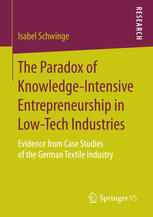

Most ebook files are in PDF format, so you can easily read them using various software such as Foxit Reader or directly on the Google Chrome browser.
Some ebook files are released by publishers in other formats such as .awz, .mobi, .epub, .fb2, etc. You may need to install specific software to read these formats on mobile/PC, such as Calibre.
Please read the tutorial at this link: https://ebookbell.com/faq
We offer FREE conversion to the popular formats you request; however, this may take some time. Therefore, right after payment, please email us, and we will try to provide the service as quickly as possible.
For some exceptional file formats or broken links (if any), please refrain from opening any disputes. Instead, email us first, and we will try to assist within a maximum of 6 hours.
EbookBell Team

4.4
72 reviewsThis book presents the first multidimensional investigation of KIE in the context of low-tech industries and gives insights in paradox conditions and specific mechanisms, using the example of the German textile industry. Therefore, the author solves conceptual inconsistencies and develops an alternative framework referring to systemic concepts of sectoral innovation systems and KIE as well as to the concept of institutional entrepreneurs. As a result, the deviation of willful actors from a restricting institutional environment and sources of entrepreneurial opportunities can be investigated more comprehensively.